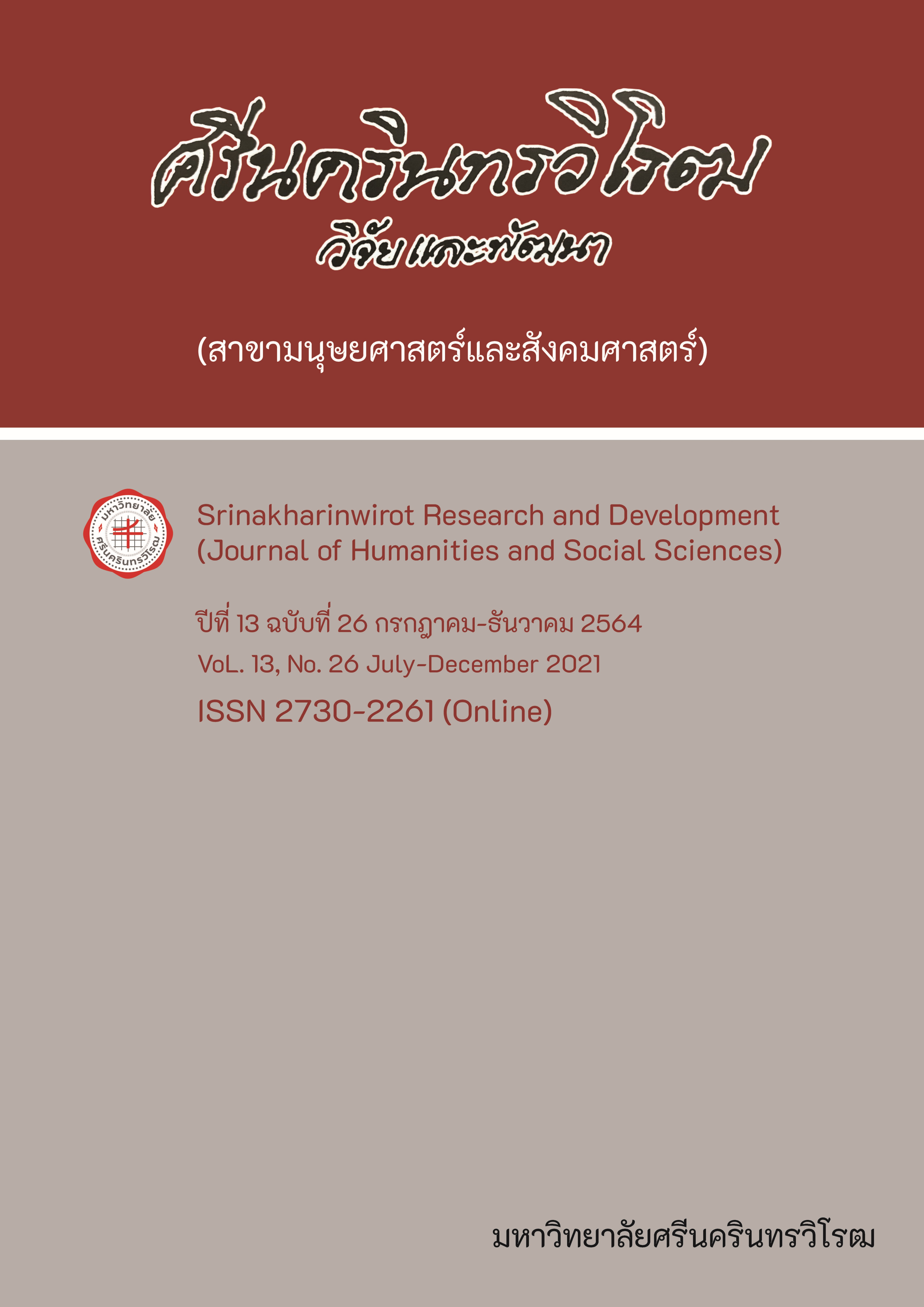EFFECTES OF RESILIENCE ENHANCEMENT OF MATHAYOM 3 STUDENTS IN OPPORTUNITY EXPANSION SCHOOLS IN PHANG NGA PROVINCE
Keywords:
Resilience Enhancement, Students, Extended Educational Opportunity SchoolAbstract
The research was a true experimental design and posttest only control group design. The purposes of this study were to compare the resilience of Mathayom 3 students in an extended educational opportunity school who took or did not take the Resilience-Enhancing Program.The sample consisted of 78 Mathayom 3 students in an extended educational opportunity school in Phang-nga and were divided into an experimental group of 38people and a control group of 40people. The experimental group used the Resilience-Enhancing Program that was 3 dimensions in this program, as well as,I have, I am, and I can. The activities provided 8 times in 4 week. The control group in this study was active control group, which used another activity that did not involve resilience. The research instruments included a Resilience Enhancing Program and a Resilience Questionnaire and descriptive statistics on a t-test for independent sample was used to analyze the hypothesis of this study. The results of the research can be summarized as follows: After the Resilience-Enhancing Program, the experimental group showed significantly total resilience score and score of 3 dimensions, such as; I have, I am, and I can, higher than the control group at .05.
Downloads
References
ประณต เค้าฉิม. (2549). เอกสารประกอบการเรียนวิชาจิตวิทยาวัยรุ่น. กรุงเทพฯ: ภาควิชาจิตวิทยา คณะมนุษยศาสตร์ มหาวิทยาลัยศรีนครินทรวิโรฒ.
มรรยาท รุจิวิทย์. (2548). การจัดการความเครียดเพื่อสร้างเสริมสุขภาพจิต. ปทุมธานี: โรงพิมพ์มหาวิทยาลัยธรรมศาสตร์.
ศรีเรือน แก้วกังวาล. (2549). จิตวิทยาพัฒนาการชีวิตทุกช่วงวัย (พิมพ์ครั้งที่ 9). ปทุมธานี: โรงพิมพ์มหาวิทยาลัยธรรมศาสตร์.
เพ็ญพิไล ฤทธาคณานนท์. (2550). พัฒนาการมนุษย์ (พิมพ์ครั้งที่ 2). กรุงเทพฯ: ธรรมดาเพรส.
คณะกรรมการการประถมศึกษาแห่งชาติ. (2541). คู่มือดำเนินงานโครงการขยายโอกาสทางการศึกษา. กรุงเทพฯ: สำนักงานนิเทศและพัฒนามาตรฐานการศึกษา.
สำนักงานคณะกรรมการการประถมศึกษาแห่งชาติ. (2543). รายงานการประเมินผล ๑ ทศวรรษ โครงการขยายโอกาสทางการศึกษา (ปีการศึกษา 2533 - 2542) เส้นทางสู่การศึกษาภาคบังคับ 9 ปี. กรุงเทพฯ: สำนักงานนิเทศและพัฒนามาตรฐานการศึกษา.
สำนักงานคณะกรรมการการศึกษาขั้นพื้นฐาน. (2550). แนวทางการกระจายอำนาจการบริหารและการจัดการการศึกษา. กรุงเทพฯ: สำนักงานคณะกรรมการการศึกษาขั้นพื้นฐาน สำนักวิชาการและพัฒนาคุณภาพการศึกษา.
สำนักงานเขตพื้นที่การศึกษาประถมศึกษาพังงา. (2558). ข้อมูลโรงเรียนขยายโอกาสทางการศึกษา พังงา. สืบค้นเมื่อ 7 สิงหาคม 2559, จาก http://www.phangngaedarea.go.th/web2013/index.php?option=com_content&view=article&id=59&Itemid=75
มะลิวรรณ วงษ์ขันธ์, พัชรินทร์ นินทจันทร์, และโสภิณ แสงอ่อน. (2558). ปัจจัยที่มีความสัมพันธ์กับความแข็งแกร่งในชีวิตในวัยรุ่น. วารสารการพยาบาลจิตเวชและสุขภาพจิต, 29(1), 57-75.
ประเวช ตันติพิวัฒนสกุล. (2550). แนวทางการจัดกิจกรรมการเรียนรู้การสร้างความเข้มแข็งทางใจสำหรับนักเรียนชั้นมัธยมศึกษา. นนทบุรี: โรงพิมพ์ชุมนุมสหกรณ์การเกษตรแห่งประเทศไทย.
Dayer, J. G., & McGuniness, T. M. (1996). Resilience: Analysis of the concept. Archives of Psychiatric Nursing, 10(5), 276-282.
Vaillant, G. E., & Davis, J. T. (2000). Social/emotional intelligence and midlife resilience in schoolboys with low tested intelligence. American Journal of Orthopsychiatry, 70(2), 215.
Sternberg, R. J., & Grigorenko, E. L. (2000). Practical intelligence and its development. The Handbook of Emotional Intelligence: Theory development, assessment, and application at home school and in the workplace, 215-243, Jossey-Bass. from https://doi.org/10.1017/CBO9780511807947.018
เพ็ญประภา ปริญญาพล. (2550). ความยืดหยุ่นและทนทานของนักศึกษามหาวิทยาลัยสงขลานครินทร์ วิทยาเขตปัตตานี. วิทยานิพนธ์วิทยาศาสตร์มหาบัณฑิต (จิตวิทยาให้การปรึกษา). มหาวิทยาลัยสงขลานครินทร์.
ศิริพร พูลสวัสดิ์. (2555). ผลการให้การปรึกษาแบบกลุ่มเผชิญความจริงที่มีต่อพลังสุขภาพจิตของผู้ติดยาเสพติดในโรงเรียนวิวัฒน์พลเมือง กองทัพเรือแบบพิเศษ. วิทยานิพนธ์วิทยาศาสตร์มหาบัณฑิต (จิตวิทยาการให้คำปรึกษา). มหาวิทยาลัยรามคำแหง.
กรมสุขภาพจิต. (2552). เปลี่ยนร้ายกลายเป็นดี พลังสุขภาพจิต. กรุงเทพฯ: บริษัท ดีน่าดู จำกัด.
นิสาพร สลางสิงห์. (2556). ความสัมพันธ์ระหว่างปัจจัยพัฒนาการและพลังสุขภาพจิตในนักศึกษาพยาบาล ชั้นปีที่ 2 มหาวิทยาลัยสยาม. วิทยานิพนธ์วิทยาศาสตรมหาบัณฑิต (จิตวิทยาพัฒนาการ). มหาวิทยาลัยรามคำแหง. กรุงเทพมหานคร.
Grotberg. E. (1995). A guide to promoting resilience in children: Strengthening the human spirit. Early Childhood Development: Practice and Reflections, 8, 7-10.
ตันติมา ด้วงโยธา. (2553). การศึกษาและพัฒนาความหยุ่นตัวของผู้ดูแลผู้ป่วยจิตเวชโดยการให้บริการปรึกษาเป็นรายบุคคล. ปริญญานิพนธ์วิทยาศาสตรมหาบัณฑิต. กรุงเทพฯ: บัณฑิตวิทยาลัย มหาวิทยาลัยศรีนครินทรวิโรฒ.
Dousti, M., Pour Mohamadreza Tajrishi, M., & Ghobari, B. B. (2014). The effectiveness of resilience training on psychological well-being of female street children with externalizing disorders. Developmental psychology (journal of Iranian psychologists), 11(41), 43-54.
Campbell, D. T., & Stanley, J. C. (1963). Experimental and quasi-experimental designs for research on teaching. American Educational Research Association.
บุญใจ ศรีสถิตย์นรากูร. (2555). การพัฒนาและและตรวจสอบคุณภาพเครื่องมือวิจัย: คุณสมบัติการวัดเชิงจิตวิทยา. กรุงเทพฯ: โรงพิมพ์แห่งจุฬาลงกรณ์มหาวิทยาลัย.
American Psychological Association. (2016). Resilience Guide for Parents and Teachers. Retrieved January 31, 2016, from http://www.apa.org/helpcenter/resilience.aspx
Gilligan, R. (2000). Adversity, resilience and young people: The protective value of positive school and spare time experiences. Children & society, 14(1), 37-47.
Roger, Carl. R. (1959). A Theory of Therapy, and Interpersonal Relationships, as Developed in the Client-Centered Framework. in S. Koch, Psychology: A Study of Science. New York: McGraw-Hill.
Coopersmith, S. (1984). SEI: Self-Esteem Inventories. California: Consulting Psychologist Press, Inc.
Holland, J. L. (1973). Making Vocational Choices: A Theory of Careers. Prentice-Hall.
Berne, E. (1964). Principles of TransactionaL Analysis. Current psychiatric therapies, 4, 35.
Goleman, D. (1998). Working with emotional intelligence. Bantam.
DeBono, E. (1971). Lateral Thinking for Management. New York: McGraw-Hill.
DeBono, E. (1991). Teaching Thinking. London: Penquin Books.
Locke, E. A., & Latham, G. P. (2013). Goal setting theory, 1990. New developments in goal setting and task performance, 3-15.
วัชราภรณ์ เปาโรหิตย์, มองกรัน ยู, เซยอง ชอย, และมิจัง ลี. (2557). การศึกษาเปรียบเทียบการรับรู้ความเครียด การปรับตัว การรู้สึกมีคุณค่าในตนเอง การกลับสู่ภาวะปกติของนักเรียนพยาบาลเหล่าทัพ สาธารณรัฐเกาหลี และนักเรียนพยาบาลทหารอากาศวิทยาลัยพยาบาลทหารอากาศ. วารสารพยาบาลตำรวจ, 6(1), 170-186.
Orozco, V. (2007). Ethnic identity, perceived social support, coping strategies, university environment, cultural congruity, and resilience of Lanina/o college students. America: The Ohio State University.
สุวิณี ภารา. (2555). ปัจจัยที่ส่งผลต่อความแข็งแกร่งในชีวิตของวัยรุ่นในกรุงเทพมหานคร. วิทยานิพนธ์ วิทยาศาสตรมหาบัณฑิต (จิตวิทยาพัฒนาการ). มหาวิทยาลัยรามคำแหง.
พรทิพย์ วชิรดิลก. (2557). ปัจจัยทำนายความสามารถในการยืนหยัดเผชิญวิกฤตของนักศึกษาพยาบาล มหาวิทยาลัยราชภัฏสวนดุสิต. วารสารการพยาบาลจิตเวชและสุขภาพจิต, 28(2), 17-31.
วราภรณ์ ตระกูลสฤษดิ์. (2549). จิตวิทยาการปรับตัว. (พิมพ์ครั้งที่ 3). กรุงเทพฯ: สำนักพิมพ์ศูนย์ส่งเสริมวิชาการ.
พนม เกตุมาน. (2550). การสอนเพศศึกษาตามพัฒนาการทางเพศ. สืบค้นเมื่อ 17 พฤษภาคม 2559, จาก http://www.psyclin.co.th/new_page_76.htm
ทัศนา ทวีคูณ, พัชรินทร์ นินทจันทร์, และโสภิณ แสงอ่อน. (2555). ปัจจัยทำนายความเครียดของนักศึกษาพยาบาลศาสตรมหาบัณฑิต. วารสารการพยาบาลกระทรวงสาธารณสุข, 22(3), 1-11.
พัชรินทร์ นินทจันทร์, ทัศนา ทวีคูณ, จริยา วิทยะศุภร, และพิศสมัย อรทัย. (2554). ความแข็งแกร่งในชีวิต และความเครียดของนักศึกษาพยาบาล โรงเรียนพยาบาลรามาธิบดี. วารสารการพยาบาลจิตเวชและสุขภาพจิต, 25(1), 1-13.
Wilks, S. E., & Spivey, C. A. (2010). Resilience in undergraduate social work students: Social support and adjustment to academic stress. Social Work Education, 29(3), 276-288.
Lating, J. M., Bono, S. F. (2008). Crisis intervention and fostering resiliency. International Journal of Emergency Mental Health, 10(2), 87-94.
Peng, Zhang, Li, et al. (2012). Negative life events and mental health of Chinese medical students. The effect of resilience, personality and social support : Psychiatry Research, 196, 138-141.
อุมาพร ตรังคสมบัติ. (2558). จิตบำบัดและการให้คำปรึกษาครอบครัว. (พิมพ์ครั้งที่ 6). กรุงเทพฯ: ซันต้าการพิมพ์.
Downloads
Published
How to Cite
Issue
Section
License
Srinakharinwirot Research and Development Journal of Humanities and Social Sciences is licensed Under a Creative Commons Attribution-NonCommercial-NoDerivs 4.0 International (CC-BY-NC-ND 4.0) License, Unless Otherwise Stated. Please Read Journal Policies Page for More Information on Open Access, Copyright and Permissions.



